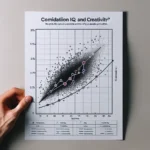Exploring the Connection between IQ and Creativity: Insights and Perspectives
The quest to understand human intelligence and creativity has long been a topic of fascination for psychologists, educators, and researchers around the globe. These two constructs, IQ (Intelligence Quotient) and creativity, are often considered when assessing an individual’s cognitive abilities and potential. As people search for ways to optimize their cognitive performance and creative output, a question arises: Is there a correlation between IQ and creativity?
Intelligence Quotient, commonly known as IQ, measures a range of cognitive skills, including logical reasoning, problem-solving, and the ability to understand complex concepts. It’s often used as a predictor of academic success and professional achievement. Creativity, on the other hand, is the ability to generate novel and original ideas, connect seemingly unrelated concepts, and produce innovative solutions to problems.
The nature of the relationship between IQ and creativity has been the subject of intense study and debate among experts in the field of cognitive psychology. Some researchers suggest that there may be an overlap in the cognitive processes that underlie both IQ and creativity. For instance, both require the ability to manipulate abstract ideas and combine information in new and meaningful ways.
Several studies have sought to unravel the intricacies of this relationship by using various measures to assess creativity, such as divergent thinking tests, creative achievement questionnaires, and assessments of creative potential. The results of these studies often point to a complex and nuanced relationship. A moderate correlation between IQ and certain forms of creativity has been observed, indicating that individuals with higher IQ scores may have an augmented capacity for creative thinking up to a certain point.
However, this correlation is not always linear and may plateau beyond a certain level of IQ. Research suggests that once an individual has an IQ that exceeds a particular threshold—often cited around 120—the predictive power of IQ on creativity diminishes. Beyond this point, factors such as personality traits, motivation, curiosity, and environmental influences may play a more significant role in determining an individual’s creative capacity.
Innovation and creative output are also heavily influenced by domain-specific knowledge and expertise. Individuals with intensive training and experience in a particular field may demonstrate higher levels of creative thinking within that domain, regardless of their IQ score. This suggests that there’s a distinction between general cognitive ability and specialized skills that contribute to creativity.
Furthermore, psychological and sociocultural factors can impact the expression of creativity. Personality traits like openness to experience, risk-taking, and tolerance for ambiguity have been linked to creative behavior. Similarly, the support of a stimulating environment that encourages exploration and values creative expression can significantly enhance creative performance.
The relationship between IQ and creativity continues to be explored through interdisciplinary research, incorporating insights from neurology, education, and even artificial intelligence. State-of-the-art technologies such as functional MRI (fMRI) help scientists observe the brain’s activity during creative tasks, providing a more comprehensive understanding of the cognitive processes involved.
In conclusion, while there is some degree of correlation between IQ and creativity, the relationship is far from straightforward. It is a complex interplay of cognitive abilities, knowledge, personality factors, and environmental conditions that converge to shape an individual’s creative potential. Understanding this dynamic can aid in the development of educational programs and interventions designed to cultivate both cognitive and creative skills, fostering a new generation of innovative thinkers prepared to address the challenges of the future.

